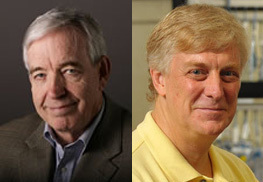
Two Notre Dame faculty members have traveled to Rome to join some 350 international participants at a Vatican conference on adult stem cell research which begins today (Nov. 9).
Historian and philosopher Philip Sloan, professor emeritus in Notre Dame’s Program of Liberal Studies, and biologist David Hyde, the Rev. Howard J. Kenna, C.S.C., Memorial Director of Notre Dame’s Center for Zebrafish Research, will be among the scientists, religious leaders, policymakers, academics and medical patients attending the two-day conference, “Adult Stem Cells: Science and the Future of Man and Culture.”
Sloan will give a conference lecture, entitled “Should the Hippocratic Oath be Extended to the Life Sciences?” and appealing for a formal pledge by life scientists to use their technological power over all stages of human life in ways that ensure human dignity. A recent historical precedent for such a pledge is one made by a group of physicists in the wake of the Manhattan Project, which produced the first atomic bomb.
Hyde’s research on the zebrafish eye includes the role of adult stem cells in regeneration of retinal neurons. The zebrafish retina is a useful model because it serves as an easily accessible portion of the central nervous system, and Hyde’s research has direct relevance for understanding the mechanisms of neuronal cell death in a variety of human retinal diseases and in the development of new stem cell therapies.
Both men are active in Notre Dame’s Initiative on Adult Stem Cell Research & Ethics, which sponsored a similar conference at Notre Dame in July.
Contacts: Philip Sloan, 574-631-5221, Sloan.1@nd.edu; and David Hyde 574- 631-8054